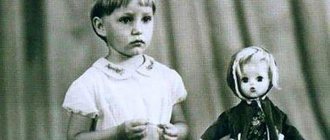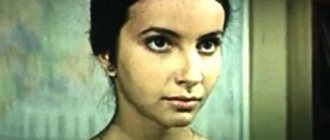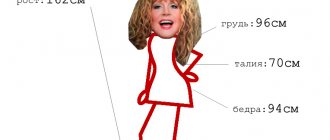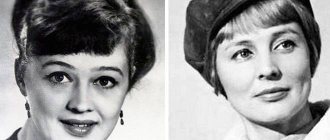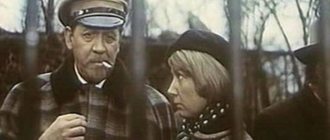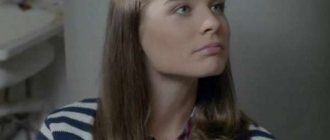Birth and family
Alla was born on May 18, 1914 in the city of Chisinau. Her real name is Levitskaya.
In Orthodox churches there have always been books in which “acts of civil status” were recorded. Such a book is still kept in the Chisinau St. Nicholas Church. There is an entry in it dated June 7, 1914 that the nobleman Nikolai Leonardovich Levitsky and his wife, also of noble origin, Evgenia Aleksandrovna Skorodinskaya, became parents on May 18, 1914. The daughter was named in honor of the Great Martyr Alla, the rite of holy baptism was performed by psalmist Zinovy Svitenko and priest Gabriel Zlatov.
The girl’s father had a musical education, which he received in Italy from the famous teacher Antonio Catogna throughout Europe. Arriving home from Italy, Nikolai Leonardovich took the pseudonym “Bayanov”. He worked as a singer at the Chisinau, Kyiv and Odessa operas.
Alla's mother came from a landowner family, educated and enlightened. Her father Alexander Skorodinsky rose to the rank of general. In her youth, Evgenia Alexandrovna studied dancing and mastered this art form to perfection.
The love of Alla Bayanova's parents was lightning fast and very romantic. They met after Nikolai returned from Italy, feelings immediately flared up with great force. Evgenia's parents refused to bless this marriage. And then everything happened like a hussar - the bride was kidnapped, and three horses on a winter night rushed the young lovers to the church, where everything was ready for the wedding. After Evgenia married Levitsky, she performed with her husband as a corps de ballet dancer.
Biography
Alla Bayanova was born on May 18, 1914 in Chisinau (then the center of the Bessarabian province) into an artistic family. According to the singer’s friend Tatyana Starodumova, Alla Nikolaevna was actually three years older than indicated in official documents[5].
Bayanova's grave at the Novodevichy cemetery in Moscow.
Father - Nikolai Levitsky, opera singer (stage name Nikolai Bayanov
). He studied singing with Antonio Cotoni. Mother - Evgenia Aleksandrovna Skorodinskaya (1882-1947), corps de ballet dancer. Evgenia Skorodinskaya came from an enlightened landowner family, her father was General Alexander Skorodinsky[6]. Ancestors on the mother’s side are from the ancient hetman family of the Skoropadskys, one of the ancestors on the father’s side is an outstanding artist of the 18th century. Dmitry Levitsky[7].
At the end of 1918, when my father returned from the front, Bessarabia became part of Romania. The family moved from country to country until in 1921 they settled in France, in Paris. Alla is sent to study at a private school at a Catholic monastery, and on Thursdays she also attends a gymnasium for children of Russian emigrants. She made her stage debut as her father's assistant at the Kazbek restaurant at the age of nine, and from the age of 13 (1927) she performed independently. In 1934 the family moved to Romania and settled in Bucharest. Bayanova performed mainly Russian and gypsy romances, performed together with Pyotr Leshchenko, Konstantin Sokolsky and Alexander Vertinsky, and regularly recorded records. In 1936, she starred as a singer of a Russian-Gypsy ensemble in the Polish comedy film (sound) by Mikhail Washinsky “Dodek at the Front”, performing a song and dance with a tambourine.
In 1941-1942, Siguranza was persecuted for singing songs in Russian and was placed in a concentration camp[8][9].
Alla Bayanova on the jury of the Romansiada competition
Having toured the whole world, she came to the USSR for the first time to give concerts only in 1976 (as part of a Romanian pop ensemble that gave several concerts in the Ukrainian SSR[10]). In 1989, having received Soviet citizenship, she settled in Moscow in a small apartment on Old Arbat. Despite her advanced age, she began to actively give concerts around Russia and participate in musical life. The accompanists with whom Alla Nikolaevna worked were David Ashkenazi, Victor Friedman, Mikhail Aptekman. She was a member of the jury of the Moscow International Competition of Young Performers of Russian Romance “Romansiada”. Even in recent years, she sometimes gave concerts.
On May 18, 2009, Alla Bayanova’s anniversary evening dedicated to her 95th birthday took place at the Moscow Operetta Theater[11]. This was the singer's last appearance on stage.
On August 30, 2011, she died at the First Moscow Hospice[12]. The cause of death was leukemia[13]. Alla Bayanova was buried at the Novodevichy cemetery on September 2, 2011[14].
In 2013, the Alla Bayanova Cultural Heritage Foundation was created by the singer’s heiress, Natalya Dolzhikova.
Personal life
Alla Bayanova was married three times.
- First husband - Georgy Ypsilanti (1906-1994) - musical director of the orchestra (ensemble) P.K. Leshchenko, died in Los Angeles, California[15];
- second husband - Stefan Shendrea (1910-1953) - Romanian boyar, landowner, Cambridge graduate, philanthropist, was repressed in 1945 and spent 5 years in camps[7],
- the third husband is Kogan[16], a fictitious marriage was arranged for the purpose of moving from Romania to the USSR[17].
Bayanova had no children; her favorite animals lived with her: dogs and cats, which she once sheltered[18].
Early childhood
Little Alla spent the first years after birth in Chisinau. Then it was the center of the Bessarabian province, and the girl remembered Chisinau as if it were not a city, but a country within a country. It was a piece of old Russian land, where landowners lived who had Oryol trotters, huge plots of land and the best vineyards. But then Soviet power came, and many wealthy families had to leave for Romania.
Alla's father fought on the fronts of the First World War, and when he returned in 1918, an endless series of moves from one country to another began. An accident helped them go abroad; their father introduced the family as a small theater troupe going on tour. If their real noble roots had become known, it is unlikely that the Levitskys would have been released, and then their fate could have been sad.
For a long time they were in the German camp for displaced persons in Celle. The baby studied German, her mother sewed and earned a living from this, then her father was accepted into the Mask Theater. Little Alla loved spending time with her dad, he took her with him to the theater, and here the future singer’s first acquaintance with the stage took place.
Childhood
Alla's father fought; he came from the front in 1918, when Bessarabia was annexed to Romania, and took his family to Paris.
Singer Alla Bayanova
The singer’s father was also an opera singer. He studied with the famous Cotoni in Rome. The artist with a baritone bass received a musical education and returned to his homeland: he performed in the opera houses of Kyiv, Odessa and Chisinau. In the mid-20s of the last century, he moved away from opera and began to engage in the pop genre. Nikolai Levitsky worked at the Bat Theater with Nikita Baliev and toured European cities. At this time, Alla studied at a French school in Paris, and mastered the Russian language in a gymnasium for Russian emigrants.
Paris
But the Levitsky family did not like indifferent and cold Berlin at all, and they decided to move to the center of Russian emigration - Paris. In 1921, they arrived in the capital of France, where Alla was sent to study at a private school at a Catholic monastery.
Once a week she went to a special educational institution for children of emigrants from Russia, where the teachers tried their best to preserve Russian speech. So Alla spoke French and Russian equally well. Despite the fact that the singer later returned to Russia, she retained her love for the French language until the end of her life and read literature in it in the original.
My father was offered to sing at La Scala; he had an amazing baritone bass. But by that time he had begun to move away from opera music, giving increasing preference to pop music. For some time, Nikolai Bayanov worked for Nikita Baliev at the Die Fledermaus Theater; they toured a lot not only in Paris, but also in London and Berlin.
But at some point, my father got tired of touring, and he decided to settle down. At that time, gypsy romances and songs were gaining enormous popularity in Paris restaurants. Nikolai Bayanov entered into an agreement with the owner of the newly opened Caucasian restaurant “Kazbek”. The establishment had a stunning hall, the staff wore Circassian national clothes, and only the most famous singers and dancers of that time participated in the musical program.
Biography[edit | edit code]
Alla Bayanova was born on May 18, 1914 in Chisinau (then the center of the Bessarabian province) into an artistic family. According to the singer’s friend Tatyana Starodumova, Alla Nikolaevna was actually three years older than indicated in official documents[5].
Bayanova's grave at the Novodevichy cemetery in Moscow.
Father - Nikolai Levitsky, opera singer (stage name Nikolai Bayanov
). He studied singing with Antonio Cotoni. Mother - Evgenia Aleksandrovna Skorodinskaya (1882-1947), corps de ballet dancer. Evgenia Skorodinskaya came from an enlightened landowner family, her father was General Alexander Skorodinsky[6]. Ancestors on the mother’s side are from the ancient hetman family of the Skoropadskys, one of the ancestors on the father’s side is an outstanding artist of the 18th century. Dmitry Levitsky[7].
At the end of 1918, when my father returned from the front, Bessarabia became part of Romania. The family moved from country to country until in 1921 they settled in France, in Paris. Alla is sent to study at a private school at a Catholic monastery, and on Thursdays she also attends a gymnasium for children of Russian emigrants. She made her stage debut as her father's assistant at the Kazbek restaurant at the age of nine, and from the age of 13 (1927) she performed independently. In 1934 the family moved to Romania and settled in Bucharest. Bayanova performed mainly Russian and gypsy romances, performed together with Pyotr Leshchenko, Konstantin Sokolsky and Alexander Vertinsky, and regularly recorded records. In 1936, she starred as a singer of a Russian-Gypsy ensemble in the Polish comedy film (sound) by Mikhail Washinsky “Dodek at the Front”, performing a song and dance with a tambourine.
In 1941-1942, Siguranza was persecuted for singing songs in Russian and was placed in a concentration camp[8][9].
Alla Bayanova on the jury of the Romansiada competition
Having toured the whole world, she came to the USSR for the first time to give concerts only in 1976 (as part of a Romanian pop ensemble that gave several concerts in the Ukrainian SSR[10]). In 1989, having received Soviet citizenship, she settled in Moscow in a small apartment on Old Arbat. Despite her advanced age, she began to actively give concerts around Russia and participate in musical life. The accompanists with whom Alla Nikolaevna worked were David Ashkenazi, Victor Friedman, Mikhail Aptekman. She was a member of the jury of the Moscow International Competition of Young Performers of Russian Romance “Romansiada”. Even in recent years, she sometimes gave concerts.
On May 18, 2009, Alla Bayanova’s anniversary evening dedicated to her 95th birthday took place at the Moscow Operetta Theater[11]. This was the singer's last appearance on stage.
On August 30, 2011, she died at the First Moscow Hospice[12]. The cause of death was leukemia[13]. Alla Bayanova was buried at the Novodevichy cemetery on September 2, 2011[14].
In 2013, the Alla Bayanova Cultural Heritage Foundation was created by the singer’s heiress, Natalya Dolzhikova.
Personal life[edit | edit code]
Alla Bayanova was married three times.
- First husband - Georgy Ypsilanti (1906-1994) - musical director of the orchestra (ensemble) P.K. Leshchenko, died in Los Angeles, California[15];
- second husband - Stefan Shendrea (1910-1953) - Romanian boyar, landowner, Cambridge graduate, philanthropist, was repressed in 1945 and spent 5 years in camps[7],
- the third husband is Kogan[16], a fictitious marriage was arranged for the purpose of moving from Romania to the USSR[17].
Bayanova had no children; her favorite animals lived with her: dogs and cats, which she once sheltered[18].
Beginning of stage career
Nikolai Bayanov had a number where he acted as Kudeyar, a blind old man. According to the plot, Kudeyar’s character needed a little guide boy, and while they were looking for a little artist for this role, they decided that Bayanov’s daughter Alla would perform.
She never studied singing specifically; the girl had a natural voice.
At their very first performance they created a sensation; it was so touching that restaurant visitors rushed to the artists, wiping away their tears. The girl was squeezed and kissed, and the father's hand was shaken. The owner of the restaurant jumped out and said that there was no need to look for anyone to play the role of a guide boy, he was ready to pay whatever the father said, if only Bayanov would continue to perform together with his daughter. Alla was called an unprecedented creature and a miracle child, and this is how her real stage activity began. They threw a lot of money into the girl’s bowl, and one lady even put a gold ring. When they came home, the father said to the mother: “You see, my daughter has earned herself a winter coat.”
That evening, dad made his nine-year-old daughter promise that someday she would return to Russia and would definitely sing for Russian hearts.
At the age of thirteen, Alla began performing on her own. She was still an awkward teenager and her grandmother jokingly said that it wouldn’t hurt the girl to become prettier, to which her mother was very offended. Although then, indeed, as if her grandmother’s wish had come true, Alla began to look prettier and blossom right before our eyes.
When the girl sang in the Casanova restaurant, the Russian artist Alexander Vertinsky heard her. He invited her to perform together in the most popular restaurant in Paris at that time - the Great Moscow Hermitage. Not every singer was accepted here; the selection was very strict. Alla worked at the Moscow Hermitage for two years, it was an amazing artistic school for her.
Here Bayanova first fell in love; her chosen one was a young man of princely origin named Andrei. He also really liked Alla, he asked her parents for permission to marry. They only decided to wait three years for the bride to turn seventeen. But Bayanova was not destined to become a princess; Andrei died in a car accident.
Work helped Alla survive the tragedy. The Bayanovs left Paris and wandered around the world for some time. First they performed in Belgrade, then in Athens, then, moving from one hotel to another, they toured throughout Europe.
Debut on stage
When his daughter grew up, Levitsky left Baliev and got a job at the Kazbek restaurant-bar. Already there Alla first appeared on stage. The father in the music program of the institution was Kudeyara - a blind old man. He needed a guide. While they were looking for him, 9-year-old Alla happily imitated him.
Alla Bayanova in her youth
The following picture was on the stage: Nikolai held a staff with one hand, tapped it on the floor, and with the other leaned on Anna’s thin shoulder. The contrast was stunning: a powerful man and a little girl. At one point, the singer was supposed to sing “Evening Bells,” but his daughter beat him to it.
Alla Bayanova sang beautifully
The audience was delighted. After the performance, all the spectators rushed to the couple, kissed Alla and shook hands with Nikolai. Then it became clear that there was no need to look for another guide. This is where Alla Bayanova’s artistic activity began. The mother of the future artist, by the way, a corps de ballet dancer, resisted and did not want to let her daughter go on stage. But then tempting offers began to arrive.
Vertinsky once came to listen to the miracle child. He called her Adelaide, compared her to the “Choir Bird” and for several days persuaded the girl to move to the Great Moscow Hermitage, where he performed at that time.
With performances at the Hermitage, his popularity began to grow. The Bannov family moved to Belgrade. There, 15-year-old Alla worked in restaurants and even toured Germany. Then there was Athens, two years later Beirut, then Palestine, Alexandria and Cairo.
In Beirut, the girl met Zinaida and Pyotr Leshchenko. Despite a tempting contact in Nice, she moved to Bucharest. Here Leshchenko helped the 17-year-old singer get a job at Pavtlion-Russ. There the artist performed gypsy and French songs, and also sang with her father.
Alla Bayanova also performed as a soloist in the gypsy choir at the Leshchenko bar. The orchestra there was led by musician Georges Ypsilanti, who later became Alla’s husband. His lyrical tango was sung by Alla Bayanova in the 30s on the records “His Master's Voice” and “Columbia”. At the end of 1930, Bayanova separated from her husband and began recording herself at the Polish studio “Syrena-Electro”.
In 1940, Nikolai Bayanov stopped singing due to illness. Alla performed at the Algamera Theater. One day, Romanian secret services approached her and took the girl away because she was singing Russian songs. She was sent far from Bucharest as an agitator for the Soviet Union and was kept for a year.
There, in the camp, Alla Bayanova learned about the beginning of the war. The girl was released in 1942, but the name of her second husband, a landowner, prevented her from performing.
At the end of the 50s, Alla Bayanova went to work at the Mozhardin bar. Pyotr Leshchenko’s second wife sang there, and Pyotr himself had already been arrested. Over the next two decades, the artist recorded 8 long plays. After the announcement of nationalist censorship, in addition to political censorship, Alla was again left without work. She began to think about moving to the USSR. But she joined the union late, for three weeks, when in 1976 she went on tour around Ukraine with a Romanian pop ensemble.
After this, Alla Bayanova visited the USSR several more times. In 1984, she was on vacation and was in Moscow, Leningrad and Riga. The singer came to Riga for the anniversary of Konstantin Sokolsky and performed several songs at the evening. Here she met the son of Oscar Strok, whom she had known back in Bucharest in the 30s.
in 1986, Alla again came to Moscow. Then she sang two records. Two years later, Bayanova had already moved to the Russian capital and found an audience and recognition. She was loved on the stage for her unique interpretation, artistry, subtle undertones, musicality and European culture.
Romanian period
Following Europe, they reached the Asian countries - Lebanon, Egypt, Syria, Jordan and Palestine. During performances in Beirut, a real sheikh began to court Alla. He came to all her concerts, invited her to dinner, and then proposed. But when my mother found out about this, she imposed a strict ban on Alla’s meetings with the sheikh. And soon the family moved to Bucharest.
While still performing in Beirut, Alla and her parents met singer Pyotr Leshchenko and his wife Zinaida Zakis. When the Bayanovs arrived in Bucharest, Leshchenko was performing there in one of the bars with his dancer sisters. Their recent acquaintance grew into a strong friendship. And soon Peter opened his own restaurant and invited Alla to sing in it.
This is how the Romanian period began in the singer’s life, which lasted almost sixty years. It was full of events, happy ones and those that I would like to quickly forget about. For a long time she worked in Leshchenko’s restaurant, and then went to the Romanian theater “Algamera”, where she performed Russian romances and songs. For such a repertoire, the secret police arrested Alla and placed her in a concentration camp, believing that the singer was conducting propaganda in favor of the Soviet Union. Bayanova spent a year and a half in the camp.
And when the Second World War ended and a socialist regime was established in Romania, Alla Bayanova’s work, on the contrary, turned out to be in great demand. She translated many Russian and Soviet songs into Romanian, and the audience listened to her with bated breath.
There was another period of disgrace in her creative life, when Ceausescu came to power. Alla at that time worked as a soloist on Romanian television and radio. Comrade Ceausescu hated everything Russian, so he forbade Bayanova to sing in this language, as well as in German and French. She had to translate her entire repertoire into Romanian.
Nevertheless, despite all the prohibitions, Alla Bayanova released seven giant discs, five of which were in Russian. She sang compositions by Velazquez, Piaf and Gershwin, composed music herself and released her own album with compositions based on poems by Konstantin Simonov and Sergei Yesenin.
Alla toured almost all over the world, but her father’s words constantly sounded in her head: “You must sing in Russia. You don’t have the right to die until you touch the Russian public.”
Why does Alla Bayanova hide her age?
| Alla BAYANOVA |
The anniversary of the legendary singer was celebrated at the Moscow Operetta Theater.
On May 18, the legendary singer Alla Bayanova turned 95 years old. The anniversary was solemnly celebrated at the Moscow Operetta Theater. Of course, at this age, it is not at all easy to gather full houses. But Alla Nikolaevna succeeded once again. There were no extra tickets available.
It seemed that everything was known about Bayanova: she began singing at the age of eight. Her father Nikolai Levitsky, (stage name - Bayanov. Bayanova's real name - Levitskaya - B.K. ), was a famous opera singer. Mom is a ballerina. The family moved to Bessarabia, which after the 1917 revolution became part of Romania, when Alla turned 17 years old. By that time, the Levitskys had toured the whole world. Bayanova has always enjoyed constant success. The Russian romances that she performed with her father were popular.
“I knew many famous Russian singers. In France, she was singing in one of the restaurants when she met Alexander Vertinsky. I was only thirteen years old. He admired: “You are a Slav with Persian eyes.” Vertinsky was my first and greatest love in life, he remained my idol.
I have heard Fyodor Chaliapin many times. Peter Leshchenko and I became close friends. He was even my officiating father at my wedding.”
| Alla BAYANOVA |
Best friend's revelations
The singer began her career in Russia when she was 74 years old. In 1988, after her solo concert was shown on TV, Bayanova became a celebrity.
Everything seems clear. But when I saw Bayanova backstage, I was stunned: she was being taken out of the dressing room in a wheelchair. The singer stood on stage leaning on a crutch. Although she carried herself well. She even sang a song in French.
Having talked with Alla Nikolaevna’s friend Tatyana Starodumova, I was even more amazed: we know so little about Bayanova!
— We have known each other since 1984, back in Bucharest. My husband worked there. In 1988, Bayanova came to the Soviet Union for the first time. The next year I was able to get a residence permit in Moscow,” recalls Tatyana Vasilievna. — Anna Yesenina (the last wife of singer Valery Obodzinsky - B.K. ) helped a lot. She registered it in her one-room apartment. Later, she was given an apartment by its then chairman Gavriil Popov from the Moscow City Council.
Secrets of Bayanova
Alla Nikolaevna outlived two husbands. She also had a third one. But this is shrouded in mystery.
| Alla BAYANOVA |
Bayanova herself recalls: “I don’t want to talk about my third marriage. It was connected with the desire to quickly get out of Romania, to get rid of the oppression that I was subjected to under the then regime” (It was a fictitious marriage associated with obtaining Moscow registration. - B.K. ).
“Now, of course, she is not in the best shape,” continues Tatyana Vasilyevna. — Age makes itself felt. And, to be honest, she is much more than 95. Bayanova is 98 years old. Although I don’t think she herself remembers this anymore. The singer's secret seems to go away with her. Her cousin Tamara told me this strange story back in Bucharest. Although according to the passport Alla Nikolaevna is from 1914.
Yes, Bayanova can’t really remember anything now. And I forgot about Bucharest, where I lived for many years. What can I say, she doesn’t even recognize any of her friends.
She has no children or relatives. The only person who looks after her and does it with dignity is Natasha (Natalia Dolzhikova. - B.K. ). Natasha extended Bayanova's life. And it was not by chance that she became the heir. After all, Alla Nikolaevna was in hospital many times in critical condition: she suffered two heart attacks and cancer.
- What's wrong with her leg?
— Metal pin in the thigh. About fifteen years ago she had a dog, Marquis. She somehow decided to step over him. The leg moved. Only Natalya knows how many operations she has undergone. But as you can see, Bayanova stood up.
Homecoming
In the late 50s, Bayanova began to seek a return to the Soviet Union. But she came here for the first time only in 1975 on a guest visa; she performed with a Romanian pop ensemble in the Ukrainian SSR.
In 1985, the USSR Ministry of Culture invited Alla to record two records. In 1986, she gave charity concerts in Moscow and Leningrad. One of these concerts was shown on television and only then did Soviet listeners recognize the unique singer, the inimitable Alla Bayanova.
At the end of 1989, she received a Soviet passport and moved to live in Moscow. Despite the fact that she was already 75 years old, Alla began active touring. Over the course of ten years, she performed 1,500 concerts, became a member of the Union of Theater Workers, and a soloist of the Moscow State Variety Theater.
She traveled all over Russia - from Blagoveshchensk to Kaliningrad, and everywhere she was worshiped and adored. She did not try to win over the audience in any way, she simply sang for them and loved with all her Russian heart. Before this, Alla sang all her life in a foreign world, and now she has returned to her homeland.
In 2009, the last anniversary performance dedicated to the singer’s 95th anniversary took place at the Moscow Operetta Theater. In 2011, Alla died, she was buried on Russian soil, at the Novodevichy cemetery in Moscow.
Star Trek
Vertinsky gives Alla personal recommendations, which help the girl get a job at the famous “Russ Pavilion”. She begins active touring. For several years, Alla traveled half the world. In the theater she performed mainly gypsy and Russian romances, for which she suffered in 1941.
Russian speech was banned in German-occupied territory, but Alla continued to sing in her native language. She was captured and sent to a concentration camp, where she narrowly escaped death. She was released more than a year later and immediately returned to the stage.
But she already had the mark of a Soviet agitator, because of which she was under constant surveillance by the secret police.
Over the next ten years, Alla changed several theaters, with which she managed to travel all over Europe. She recorded several records that were wildly popular. But I couldn’t find peace anywhere. From time to time they made it clear to her that she was disliked by the Romanian authorities, so Alla increasingly began to think about emigrating.
Alla first came to the Soviet Union only in 1976, already being a star of the European level. The three-week tour flew by quickly, and Alla was sorry to leave the country. Later she went on tour several times to different cities of the USSR.
She really liked Moscow and Leningrad, and she specially came to Riga for vacation. And in 1986, at the age of 72, she finally moved to Moscow.
Being a famous and accomplished artist, Alla could simply relax. But she couldn’t imagine her life without stage and music. In the USSR she found her audience and began performing concerts again. Almost immediately after moving, she recorded two solo albums with romances. The singer became an honorary member of the jury of the prestigious music competition “Romansiada”.
Two years before her death, she gave a farewell solo concert at the Moscow Operetta Theater. At that time she was already 95 years old. But the strong voice continued to sound as beautiful as in his youth and captivated the listeners. The singer died on August 30, 2011 from acute leukemia.
The actress's body was buried with great honor at the Novodevichy cemetery. And in memory of her, her companion and heiress Natalya Dolzhnikova organized a cultural heritage fund.
Personal life
Since Alla began an independent life early, and was surrounded by fans from early childhood, it is not surprising that she fell in love for the first time at a young age - at only 14 years old. Her chosen one was a descendant of a noble family, Prince Andrei, who immediately asked Alla’s mother for her daughter’s hand in marriage.
She did not refuse, but delayed the wedding for three years. The celebration did not take place - soon Andrei died in a car accident.
For a very long time Alla could not recover from such a blow. She was saved only by constant tours, during which she met an Arab sheikh. Impressed by the girl's beauty and talent, he proposed to her. But Alla’s mother categorically opposed such a union and forbade her daughter to even think about an Arab admirer.
A few years later, the singer secretly married her new lover, successful pianist Georges Ypsilanti. His mother didn't like him either. Alla was afraid of her all her life, so when she found out about her pregnancy, she did not dare to leave the child. Alla will regret this all her life - she lost the opportunity to have children after an abortion.
Alla cheated on George. Moreover, her new chosen one turned out to be Russian emigrant Sergei Vinogradov. He was married and almost 20 years older than Alla. This story should have been hidden, but the girl did not like lies and confessed everything to her secret husband. He immediately broke off the relationship.
Alla met her second husband in Bucharest. It was the nobleman Stefan Shendry. And at first everything went well. But after the establishment of socialism in Romania, mass repressions of the nobles began, and Stefan was exiled to hard labor.
Three years later he returned. But he was already broken and embittered. Scandals began in the family, he even tried to raise his hand against his wife. Alla did not tolerate such an attitude and filed for divorce.
She entered into her third marriage of convenience with an old acquaintance. In those days, this was the easiest way to obtain Soviet citizenship without any questions asked. Mikhail Gorbachev helped with the apartment, who gave the singer a small apartment on Old Arbat.
But without love, she could not build a relationship and very quickly divorced again. In recent years, Alla lived with her companion Natalya Dolzhikova, with whom she had a tender friendship.
Personal life
While working in Bucharest at Pyotr Leshchenko's restaurant, Alla fell in love with the musical director of his orchestra, composer and pianist George Ypsilanti. Everyone called him among themselves in the European manner - Georges. Mom was against this marriage, so Alla, having learned about the pregnancy from Georges, had an abortion. But then she still disobeyed her parents and got married to Ypsilanti.
But this marriage did not last too long. One day, Alla succumbed to a passing infatuation and cheated on her husband with an almost unknown married man. She didn’t want to deceive Georges and told him about it, and he packed his things and left.
Alla got married for the second time after she was liberated from a concentration camp in 1942. There was just a difficult period in her life, she herself was after her arrest, her parents were sick, her house was ruined. And then on the path of life I met a handsome man, Romanian landowner Stefan Shendrea. So Alla became a lady and moved to his noble and rich estate Ungureni. True, it was abandoned, but she managed to restore everything. They had cows, sheep, horses, and farmed forests and land. The singer left the stage for a long time.
In 1945, her husband was repressed. By this time, Alla had buried her parents, and now she was left alone with her troubles and problems. The husband spent five years in prison, and when he came out, he was a completely different Stefan, embittered at the whole world. He took out all his anger on his wife. Alla did not tolerate this and left. Then she found out about the pregnancy, but had a miscarriage in the fourth month. Doctors said that she would no longer be able to have children.
The third marriage in the singer’s life was fictitious; she arranged it to speed up the move from Romania to the USSR.
